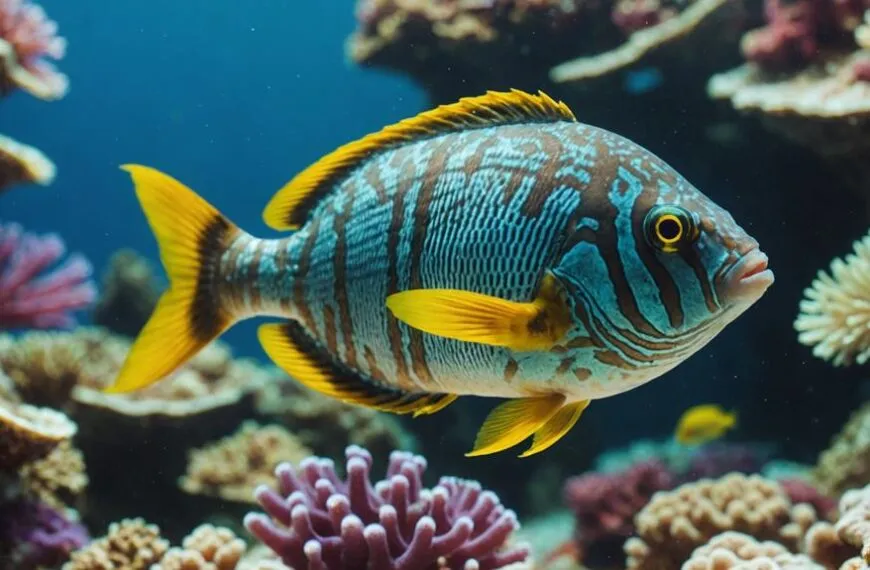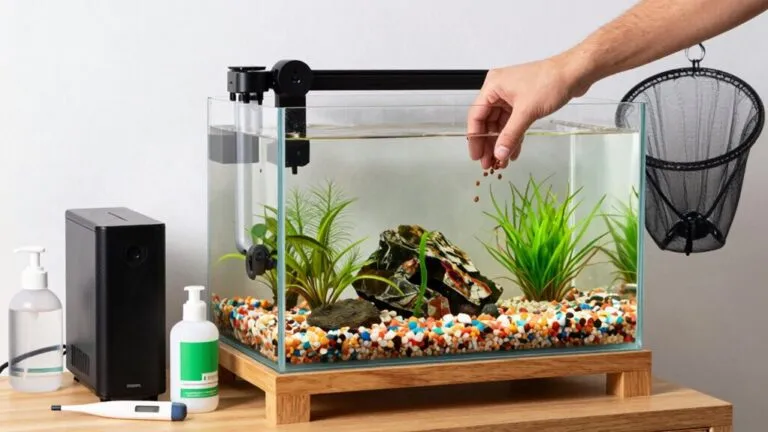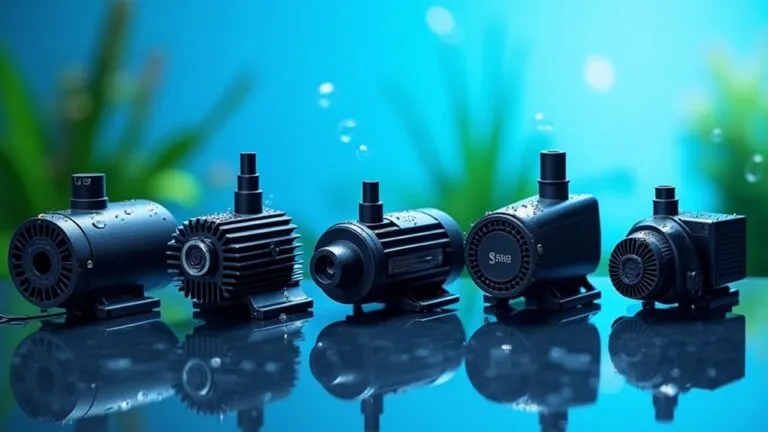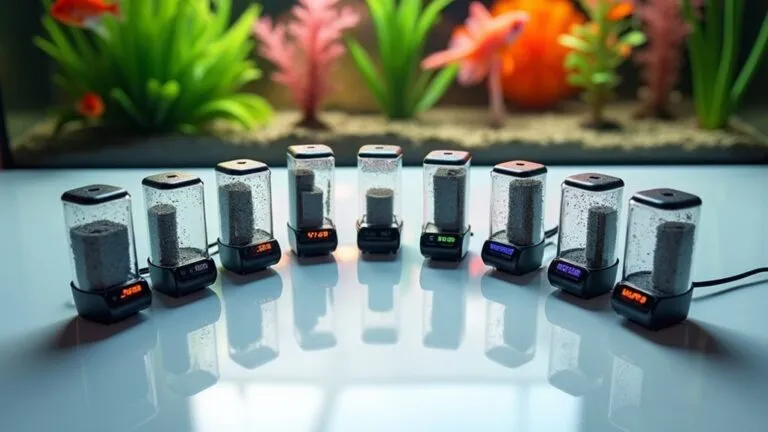Your freshwater fish might not speak up, but they sure show signs when they're feeling under the weather! First, watch for changes in swimming—like upside-down antics or rubbing against things. A sudden loss of appetite is another red flag; if they're hiding or refusing food, something's off. Keep an eye on their skin for lesions or excess mucus, and notice their breathing; if they're gasping or swimming at the surface, they're in distress. Lastly, social isolation and lethargy can point to health issues. If you're curious about what to do next, hang tight for some helpful tips!
Contents
Changes in Swimming Behavior
When you observe your fish, changes in their swimming behavior can be a clear indicator of health issues. If you notice your fish swimming upside down or in circles, it's time to pay attention. Disorientation like this often signals serious health problems that need immediate care. Regular testing of water quality parameters, such as pH and ammonia levels, can help identify environmental stressors that may contribute to these behaviors essential test parameters.
Healthy fish glide effortlessly through the water, but if you spot clamped fins or erratic movements, they might be trying to tell you something isn't right.
Sudden lethargy or isolation from their tank mates can also indicate stress or illness. If your fish seems to be avoiding social interactions, it's a red flag. You might even see them rubbing against hard surfaces—this behavior shows irritation and could mean they're dealing with parasites or skin infections.
Always keep an eye on these changes in swimming behavior, as they can coincide with other symptoms, such as decreased appetite or visible lesions. The sooner you catch these signs, the better chance you have of diagnosing and treating any underlying health problems.
Loss of Appetite
Loss of appetite is a significant warning sign that your fish might be facing health challenges. When your once-hungry fish suddenly starts ignoring food, it's time to pay attention. A consistent loss of appetite can indicate underlying issues like stress, infections, or even poor water quality, such as high ammonia levels from overfeeding.
If your fish is sick, this could lead to malnutrition and weaken their immune system, making it harder for them to bounce back.
You might notice some behavioral changes, too. If your fish is hiding or isolating themselves from the rest of the tank, that could signal distress. And if you see multiple fish present with a loss of appetite, it's likely a water quality issue that needs immediate attention.
Regular maintenance can help prevent these problems. Testing the water can help you identify any issues before they escalate.
Physical Symptoms and Wounds
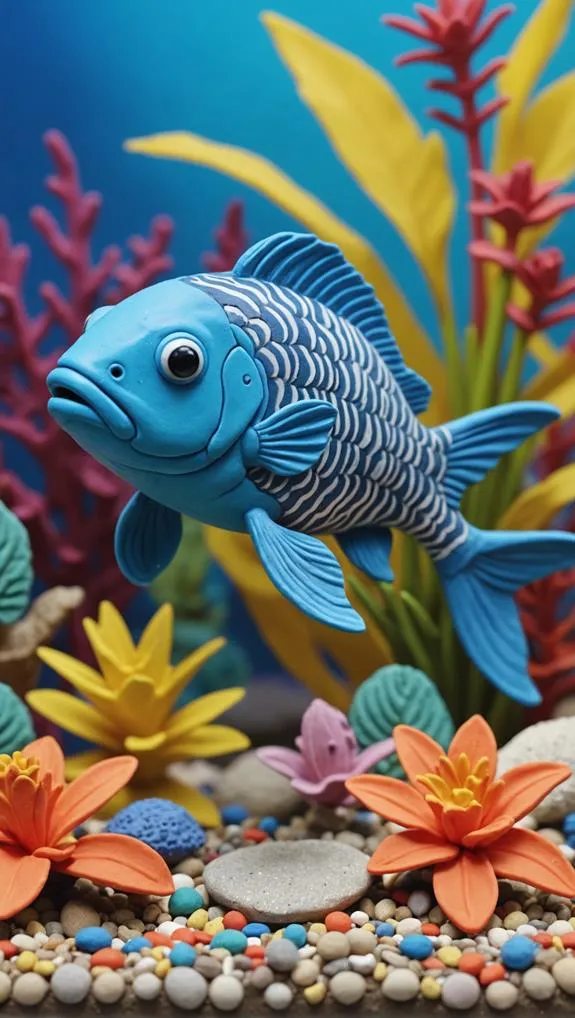
Physical symptoms and wounds can serve as clear indicators that your fish is unwell. If you notice visible lesions, ulcers, or wounds, it's time to pay attention. These physical symptoms of sick freshwater fish often appear quickly, usually due to trauma or infections related to stressors like poor water quality, which can lead to cloudiness and algae growth issues.
Discoloration or excessive mucus on your fish may also signal trouble, suggesting potential infections or irritation from their environment. If you spot that distinctive "pinecone" appearance, don't ignore it; it could indicate dropsy and underlying kidney or gill issues.
Remember, ulcers often arise as a result of stressors, with a staggering 90% linked to poor water quality. This means making environmental improvements can be crucial for your fish's recovery.
And let's not forget about trauma-related wounds—these can show up almost overnight! Whether from a feisty tank mate or an outdoor predator, quick action is essential. Keeping a close eye on your fish helps you catch these signs early.
After all, a happy fish is a healthy fish, and you're their best advocate!
Breathing Difficulties
After keeping an eye on physical symptoms and wounds, the next area to monitor is your fish's breathing. You might notice increased respiratory rates, where your fish is rapidly moving its gills. This could signal stress or poor water quality, possibly even gill parasites lurking around.
Regular testing of water parameters, such as ammonia and nitrite levels, is essential to identify potential issues early and maintain a healthy environment for your fish key water parameters. If you see your fish gasping at the water's surface, it's a clear sign of labored breathing, indicating oxygen depletion or ammonia poisoning. Time to check that water!
Discolored or pale gills? That's a red flag for respiratory distress, often linked to bacterial infections or toxins. Your fish might swim near the surface instead of mid-water, hinting at acute breathing difficulties.
Pay attention to these patterns!
Chronic breathing issues, if ignored, can lead to serious health complications and even death. So, being proactive is key. While fish can't exactly tell you they're feeling under the weather, understanding these signs can help you take swift action.
Social Isolation and Lethargy

When you notice your fish distancing itself from the school, it can be a sign of trouble. Social isolation and lethargy may indicate underlying health issues or stressors. If your once-active freshwater fish is now hanging out alone, it's essential to pay attention. This behavior could stem from aggression from tank mates or unsuitable water quality.
Lethargy, or simply being lazy, is often an early warning that something's not right. You might see reduced activity levels or a lack of interest in food.
Behavioral changes, like clamped fins or decreased swimming, can accompany this isolation, hinting at infections or other illnesses.
If these signs persist, your fish's health could deteriorate quickly. That's why it's crucial to investigate right away! Check your water quality, ensure the tank mates are compatible, and look for any signs of disease.
Prompt treatment can make a world of difference in helping your fish recover. Remember, a happy fish is a healthy fish, and by keeping a close eye on their behavior, you're doing them a great service!
Frequently Asked Questions
How Do You Know if a Fish Is Unwell?
You'll know a fish is unwell by observing unusual behavior, abnormal swimming patterns, body discoloration, and fin damage. Appetite changes, increased breathing rate, and visible secretions also indicate health issues needing your immediate attention.
How to Treat a Sick Fish in an Aquarium?
To treat a sick fish, identify symptoms, implement quarantine procedures, and choose appropriate medication types. Enhance the environment, maintain water quality, adjust diet, and reduce stress to support recovery and overall well-being.
How Do I Know if My Fish Has a Bacterial Infection?
To determine if your fish has a bacterial infection, look for fin rot, increased mucus, or lesions. Monitor water quality and consider treatment options in a quarantine tank to prevent common pathogens from spreading.
Is My Fish Stressed or Sick?
When it comes to your fish, you can't judge a book by its cover. Watch for behavior changes, stress triggers, and signs of distress. Ensure healthy tank conditions, a balanced diet, and compatible tank mates for stress relief.
Final Thoughts
Taking care of your freshwater fish can sometimes feel like a balancing act, but spotting the signs of sickness early makes all the difference. Remember, changes in swimming, appetite, or social behavior are red flags you shouldn't ignore. Keep a close eye on them, and don't hesitate to seek help when needed. After all, a healthy fish is a happy fish! So, keep your fins up and stay proactive—your aquatic buddy will thank you!


